Posts Tagged ‘Rick Perry’
Notice Something Missing So Far This Summer? Smog Alerts.
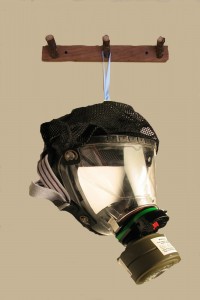 Along with cooler weather in general and a little more rain this Spring has come some relief from really dirty air in DFW.
Along with cooler weather in general and a little more rain this Spring has come some relief from really dirty air in DFW.
Last year at this time, we'd already had 6 "exceedences" of the old 1997 85 parts per billion ozone standard in May, and countless exceedences of the tougher new 75 ppb standard that is supposed to be attained by 2018. As of today, we haven't had one even one monitor reading above 85 ppb and only a handful in the 75 to 85 ppb range.
For the last two years in a row, DFW has seen a decrease in air quality, and an increase in smog. Could 2013 be the year that trend is halted?
Weather takes a lot, or even most of the credit. Cooler temperatures and more moisture are not conducive to ozone creation. But unlike during the recession, new car sales seem to be taking off the way the Rick Perry-approved engineers at the Texas Commission on Environmental Quality wanted them to two to three years ago. It's possible that the replacement of older dirtier vehicles with newer, cleaner ones by the thousands has finally made a difference you can't see. There's also the impact of cleaner operations at the Midlothian cement plants thanks to citizen victories over the last decade, (although the kilns are rapidly turning back into garbage burners), fewer coal burning plants downwind, and other improvements up and down the southeast to northwest axis that carries our predominant winds from Houston to here.
On the other hand, last June was pretty quiet until the 24th, and then all hell broke loose, with ozone levels into the triple digits. 2012 turned out to be a very bad year for safe and legal air.
And there's the unknowns that nobody's really examining closely – at least not in public. How much ozone pollution is being caused by the natural gas infrastructure in the Barnett Shale that's been built over the last decade and gets bigger every week? How much is the gas industry polluting upwind of us in places like Freestone County between here and Houston? Does the continuing boomtown growth in DFW population cancel out the improvement in individual vehicle emissions?
From a regulatory point of view, no matter how good or bad this summer is, we don't get credit for it either way. Another bad year wouldn't be held against us. Likewise, no violations this entire year wouldn't buy us any more goodwill from EPA. We're in a limbo period, where everyone is just waiting around for the average readings from 2015 -2018 to accumulate and tell us what category of compliance with the new 75 ppb standard we're in. While it would certainly help the cause if the region had some forward momentum in lowering the levels of smog going into 2015, officially, it makes no difference at all – unless you're breathing air. Then, according to EPA's own scientists, anything above 65-70 ppb is damaging to human health.
Theoretically, the TCEQ is supposed to be putting together yet another "DFW clean air plan" to reach that 75ppb standard, to be implemented sometime between now and 2015. The last time it tried to reach such a regulatory goal – the 85 ppb standard – it ended up with a plan that worsened air quality here by starting way too late and basically doing nothing but watching as new cars were going to clean up the air in the middle of a recession. (By the way, the "official" regulatory date of that failure is coming up next week even though the failure was certain last summer. Stay tuned to see if TCEQ acknowledges it in any way).
It's the summer of 2013. Any big changes that need to be in a summer of 2015 clean air plan should be being discussed and set in motion now, especially if they need 2015 state legislative approval, or lead times for industry to adapt. However, state or regional officials have yet to call a meeting of the local advisory group that's supposed to be monitoring the development of that plan. No date is set for such a meeting.
We can hope that a confluence of circumstances is making it possible to have cleaner air in DFW, but as long as Rick Perry is Governor, it's unlikely such an important public health goal will override political agendas.
Perry’s Coal Rush Ends With a Whimper, not a Bang
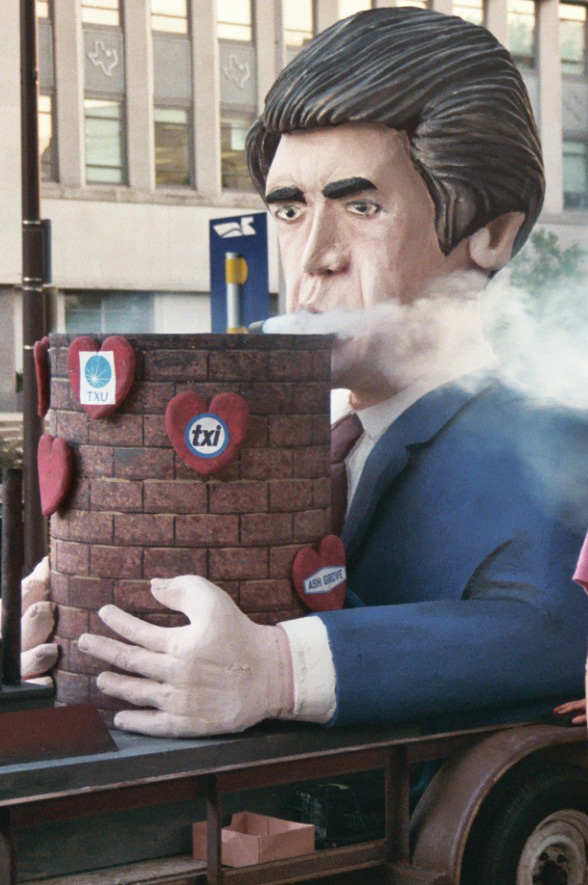 In 2006, Governor Perry announced that he was going to fast track over a dozen new coal plant permits in East and Central Texas. There was an instant hue and cry. Not only citizens but cities protested. Believe it or not, the same Dallas City Hall now prostituting itself for gas refineries was actually out organizing a multi-municipality alliance with Houston against the coal plants and Perry. Downwinders launched its now infamous "Smokestack Love" cross-state tour, complete with a 16-foot long parade-quality float with a smokestack-inhaling Perry.
In 2006, Governor Perry announced that he was going to fast track over a dozen new coal plant permits in East and Central Texas. There was an instant hue and cry. Not only citizens but cities protested. Believe it or not, the same Dallas City Hall now prostituting itself for gas refineries was actually out organizing a multi-municipality alliance with Houston against the coal plants and Perry. Downwinders launched its now infamous "Smokestack Love" cross-state tour, complete with a 16-foot long parade-quality float with a smokestack-inhaling Perry.
Unfortunately, opponents weren't able to stop all the plants. A leftover 1980's permit for the Oak Grove lignite plant north of College Station did get approved over the objections of local landowners. But most were derailed by fierce resistance or lower natural gas prices brought on by the heavy exploitation of the Barnett and Eagle Ford Shale plays.
Last Thursday, the final domino of that proposed 2006 wave of new coal plants fell with the announcement that the White Stallion plant near Bay City was being canceled.
"The news marks a victory for opponents of coal in Texas, notably the Environmental Defense Fund and the Sierra Club, who have worked for years to oppose the White Stallion and other coal power projects in the state. At this point, there are no longer any major new traditional coal power plants planned in Texas. All of the new projects are primarily natural gas and wind power, with some solar."
Congratulations to all those who worked so hard to see these bad ideas finished off for good. But remember there are still older coal plants in East and Central Texas that are among the largest point sources of pollution in the state, and the nation. Having now eliminated new potential clean air threats from the last of the Perry-proposed coal rush, the Sierra Club is turning its attention to the existing plants that are long past their prime and need to be replaced with cleaner sources of energy.
An Idea Worthy of Our Consideration
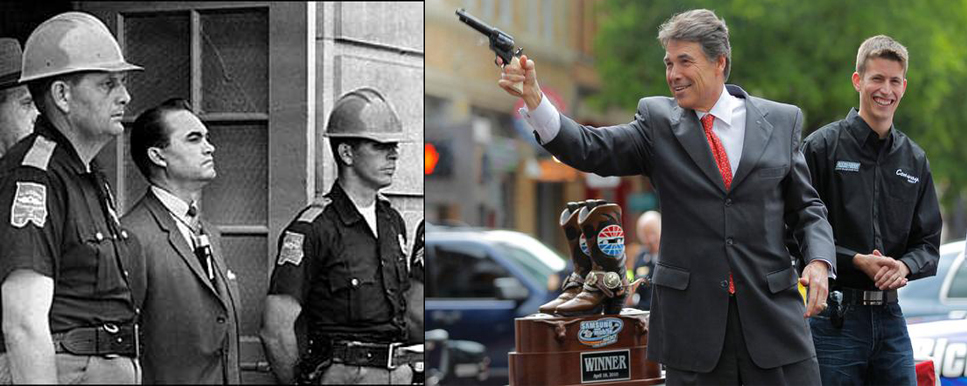 Under current law, EPA can designate states to enforce federal environmental laws if they, in fact, actually enforce the law and run competent programs. Once given by the EPA, rarely is this power taken away from a state.
Under current law, EPA can designate states to enforce federal environmental laws if they, in fact, actually enforce the law and run competent programs. Once given by the EPA, rarely is this power taken away from a state.
But when a state doesn't do a good job of enforcing the law or runs a program ineptly, the EPA considers taking back responsibility.That's happened recently in Iowa with the enforcement of the Clean Water Act. The Iowa Department of Natural Resources had been heavily criticized by state environmental groups for allowing huge CAFOs – Concentrated Animal and Feeding Operations to pollute the state's waterways. Beginning five years ago, they petitioned the EPA to take direct control of enforcing the Clean Water Act in Iowa. Their petition prompted an EPA investigation. The results confirmed the criticisms of the environmentalists and now the EPA is seriously thinking about stepping in.
Texas environmental groups should take note.
There is plenty of evidence on the public record to suggest Governor Perry and his Texas Commission on Environmental Quality are engaged in an active campaign of "nullification" of federal environmental laws just as Alabama Governor George Wallace was intent on negating federal civil rights legislation and rulings in the 1960's. But instead of standing in the schoolhouse door, Perry is using the world's second largest environmental agency to slow and obfuscate enforcement of the law in the name of his own over-the-top pro-industry agenda. The penalty for this kind of behavior 50 years ago was having the National Guard and Federal Marshals come into Alabama and make sure the law was followed. All we need in 2012 is for EPA to re-establish competent control over half a dozen federal environmental laws.
And if you don't think our Governor and his environmental agency are so nefarious as to construct a strategy to frustrate federal environmental law enforcement, what about stripping them of their responsibilities strictly because of their incompetence at administrating the federal programs. Take the last DFW air plan.…please. TCEQ kept insisting that the turnover of new cars on the road would almost singe-handedly produce the cleanest air in 25 years in North Texas. Not only was that forecast epically wrong – and off by a larger margin than the TCEQ's last clean air plan failure in 2007 – the plan actually left the region with dirtier air than when it began. It was bad science. Call this incompetence or call it incompetence by design. Either way, the result is the same. The Clean Air Act is not being effectively enforced by the state of Texas.
There are excellent reasons to believe that as long as Governor Perry and his TCEQ acolytes are making the decisions, DFW residents won't be able to breathe safe and legal air. It was obvious to many observers that needed pollution controls for industry didn't get included in the state's 2011 air plan for DFW because it would hinder the Governor's ability to raise money from this sector and it might appear to contradict his anti-regulatory political message. Rumor has it that Perry will run for Governor again in 2014 in order to re-position himself for another try at the Presidency in 2016. DFW's next clean air plan is due from the Perry TCEQ in….2015. As long as Perry has ambitions for higher office, your lungs are doomed
Along with trying to mobilize public opinion and rally local officials, maybe one thing DFW residents should be doing by way of self-defense is preparing a petition to EPA requesting it take over Texas' enforcement of the Clean Air Act.
TCEQ Lets Industry Avoid $90 Million in Fines, Asks Drivers to Pick Up the Tab
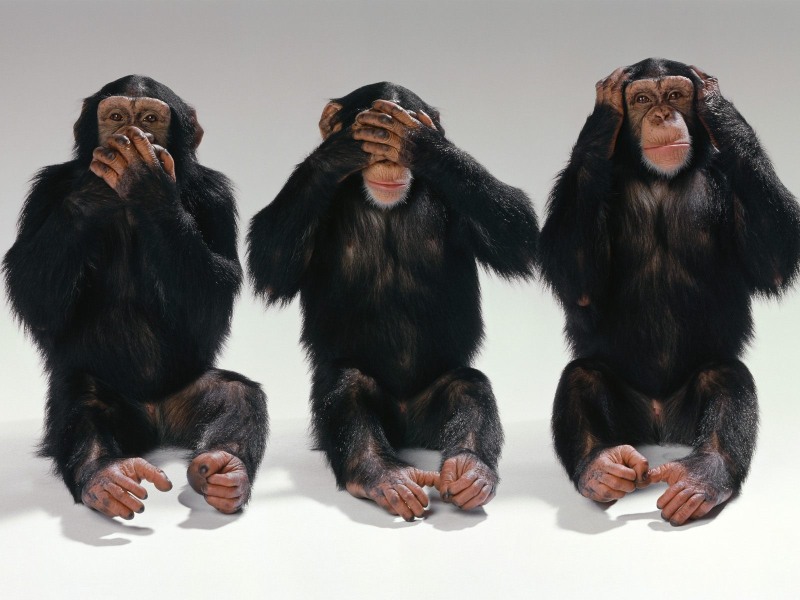 Here in DFW, we've paid the price of continuing dirty air for the state's bias toward blaming all air quality problems in DFW on cars. As cars got so much cleaner, all of our smog problems were supposed to literally go "poof." This was almost the entire basis of the just-failed TCEQ clean air plan, and it didn't work. Turns out, there might be more causing our smog problems than just cars.
Here in DFW, we've paid the price of continuing dirty air for the state's bias toward blaming all air quality problems in DFW on cars. As cars got so much cleaner, all of our smog problems were supposed to literally go "poof." This was almost the entire basis of the just-failed TCEQ clean air plan, and it didn't work. Turns out, there might be more causing our smog problems than just cars.
Nevertheless, the bias persists because the ideological slant of the TCEQ's boss, Governor Perry, won't allow it to pursue a more balanced approach. Via the Houston Chronicle comes the latest way it's getting expressed in bad public policy – by letting pollution control measures be paid off by fees on individual drivers instead of fines assessed against large polluters that are targeted specifically for that purpose.
"The Texas Commission on Environmental Quality is asking the federal government for permission to waive fines for the region's 260 chemical plants, oil refineries and other large facilities.
The commission argues that it should not have to collect those fines because it already is raising money for smog-fighting programs through vehicle inspection fees and sales taxes for diesel equipment, among other revenue sources.
For years, the fees and taxes have funded a program that helps cover the cost of replacing or retrofitting dirty, old vehicles and equipment, such as locomotives, haul trucks and tugboats. The program has helped to improve air quality in the state's smoggiest cities."
The cover story for doing this is that the Commission would much rather the fine money be spent on actual pollution controls at the offending facilities – though there is nothing, especially the TCEQ, to make them do so – and that consumers would just pay the price down the line. We don't know what's more insulting – the incredibly thin and flimsy veneer of these excuses, or that the TCEQ expects any one to believe this clap-trap, which comes right out of our failed Governor's presidential campaign. What ever happened to getting tough on crime?
As for industry, well, it's just downright unfair Houston industry has to pay any fines at all for being out of compliance with a Carter-era ozone standard! Those that have seen the slides of Houston air pollution blowing into DFW will be particularly bedazzled by this plea from a corporate attorney,
"Jed Anderson, a Houston-based attorney who represents industry in regulatory matters, said the commission's proposal is a fairer distribution of the burden because cars and trucks produce so much smog-forming emissions. Even then, he said Houston should not have to pay at all, saying the amount of pollution that blows into Texas from other countries is enough to push the region out of compliance for ozone."
Funny, that's what TCEQ and their DFW local flunkies say about y'all. In fact, at the turn of the current century, DFW tried to get a pass for violating the ozone standard because, if you didn't count the stuff coming in from Space City, we would have, you know, theoretically been able to meet it.
Sorry Mr. Joe and Joann Six-Pack, but if you drive an inspected car that gets 70-90% pollution removal and deposits a thousand or so pounds of air pollution a year, you're not a constituent of TCEQ, you're the enemy.
On the other hand, if you operate a facility that not only pollutes the air with millions of pounds of pollution because you won't install the best equipment, but has also been breaking the law, "Right this way, Monsieur." Environmental Defense Fund's Dr. Elena Craft says in the Chronicle piece, "The commission is basically doing everything it can not to collect fines from industry" – and everything in its power to once again put the onus on drivers.
All You need to Know About TCEQ’s Commitment to Clean Air
TCEQ Can’t Handle the Truth Over DFW Air Plan Failure
 Here's further proof that Governor Perry has transformed the world's second-largest environmental agency into just another extension of his on-going political campaign.
Here's further proof that Governor Perry has transformed the world's second-largest environmental agency into just another extension of his on-going political campaign.
After waiting for a couple of days for the Texas Commission on Environmental Quality to say something about the failure of its latest DFW clean air plan to reach a 1997 ozone standard by the end of this "ozone season," Downwinders put out a release on Monday criticizing the agency for leaving the air dirtier than when the plan was begun in 2010.
To succeed, the TCEQ plan had to bring smog numbers down at all DFW monitors to 84 parts per billion or below by the end of this last summer, using three-year rolling averages incorporating readings from 2011 and 2010. The agency blithely predicted it would do just that and even published computer-modeled estimates of what the averages would be at the end of 2012. According to TCEQ we were supposed to see record low ozone levels this summer. So low that there would be no violations of the 1997 ozone standard for the first time since it was implemented.
Although the official EPA regulatory deadline to judge the plan a success or failure is June 15th, 2013, it's fate has already been decided by the data collected the three previous summers. That's important to know. TCEQ doesn't get another summer to prove that it's brilliant plan to sit back and watch people buy cars will work somehow, someway. The Clean Air Act only allows them three years to get their act together per plan. The clock started ticking in 2010. It stopped ticking on November 1, 2012, at the traditional end of DFW's ozone season. That was the practical deadline. All that's left to do is type up the report to EPA and submit it come June 15th of next year. They've run of of time.
But unless you've gone through this process before, or had been following the plan closely, you wouldn't necessarily know this. That was the case with Andrew McLemore, a reporter for the Fort Worth Weekly, who'd been assigned to follow up on the Downwinders release and e-mail the TCEQ for a response.
 What TCEQ spokesperson Lisa Wheeler said to McLemore was that of course the agency never claimed to be able to meet the goal by 2012. We said we'd do it by June of 2013 – the regulatory deadline. Ohhhhh.
What TCEQ spokesperson Lisa Wheeler said to McLemore was that of course the agency never claimed to be able to meet the goal by 2012. We said we'd do it by June of 2013 – the regulatory deadline. Ohhhhh.
This is a great answer for a term paper that's late, but not so much when there's no more summers between now and June of next year to use in your clean air plan. Ozone data for November to June isn't going to do you any good because (unless global warming really accelerates) that's not the time of year we see high ozone numbers. And the plan has to use the highest of the high numbers. Telling McLemore that everyone had to wait until June to know the final results of the DFW air plan was like telling him to wait for the cake to cool for eight months after its' already been taken out of the oven. The thing is done. It's not getting any bigger, or sweeter-tasting, or rounder. It's not changing character or content. It is what it is right now.
TCEQ knows this. Lisa Wheeler knows that there will be no new numbers to add or subtract from that will make any difference. There will be no 2013 average that they can use to change the results from what they are at this moment. It's all already been determined by this summer's miserable showing, and the miserable showing before that in 2011. That's what makes this answer of theirs so incredibly cynical.
Wheeler apparently wanted to confuse McLemore, in essence saying, "Gee we really didn't fail yet – you have to wait until next June to conclude that. We still have time to change the outcome! " But because the data won't change, the results won't change either.
Don't take our word for it. TCEQ has a whole web page devoted to chronicling the proof that the DFW air plan has already failed – http://www.tceq.state.tx.us/cgi-bin/compliance/monops/8hr_attainment.pl
You'll notice this page, titled "Compliance with Eight-Hour Ozone Standard" has only three columns of data, one for 2010, one for 2011, and one for 2012. No column for 2013. You'll also notice that at the end of that three year cycle, there are two sites with running average that are at or above 85 ppb. The results are in. TCEQ's second clean air plan for DFW to reach the old 1997 standard in the last four years has failed. TCEQ just can't man-up and say so.
Not only has it failed. It's actually left DFW air dirtier than when it began. Here's why:
– Two monitors now have a three year running average (design value) of 85ppb or more. This is the same number as 2010, so no change at all on that front.
– The three year average for the region's highest reading actually went up 1 ppb from 2010 (86 ppb), to 2012 (87 ppb), with a spike of 90 ppb last year. Worse than 2010.
– Six monitors saw a violation of the 85 standard this summer by posting a 4th highest reading that was 85 ppb or above. Only one monitor did that in 2010. 2012 is five times worse than 2010 by this measuring stick.
– The location of those violating monitors is of concern because they moved further east from the northwestern corner of Tarrant County where they'd been "contained" – all the way into central Dallas, where the "Hinton St. monitor" near Mockingbird and I-35 recorded a 4th highest reading of 85 ppb or above for the first time since 2005. Also proof things have gotten worse, not better.
So the latest TCEQ DFW clean air plan achieved the following: More numerous and geographically-dispersed violations, with an increase in average levels of air pollution that takes it further away from the 84 it needs to achieve, instead of bringing it closer.
Heckava job.
To fully appreciate the agency's mendacity in its public approach to this failure, all you have to do is ask yourself how TCEQ would have reacted had it somehow achieved the miraculous decrease in air pollution its clean air plan promised. Go look at the front page of the TCEQ website. It has almost as many diatribes against the EPA as it does real environmental policy news, including opinion pieces written by TCEQ Commissioners. Do you think the agency would have waited until June 15th, 2013 to trumpet its success just because of a meaningless, bureaucratic deadline? Neither do we.
The TCEQ is never going to be a trustworthy source of information or expertise in the fight against DFW smog again while Governor Perry is in office. The sooner local officials wise-up and chart their own path, the better.
Perry’s Politicizing of Science Costs Anti-Cancer Agency its Stars
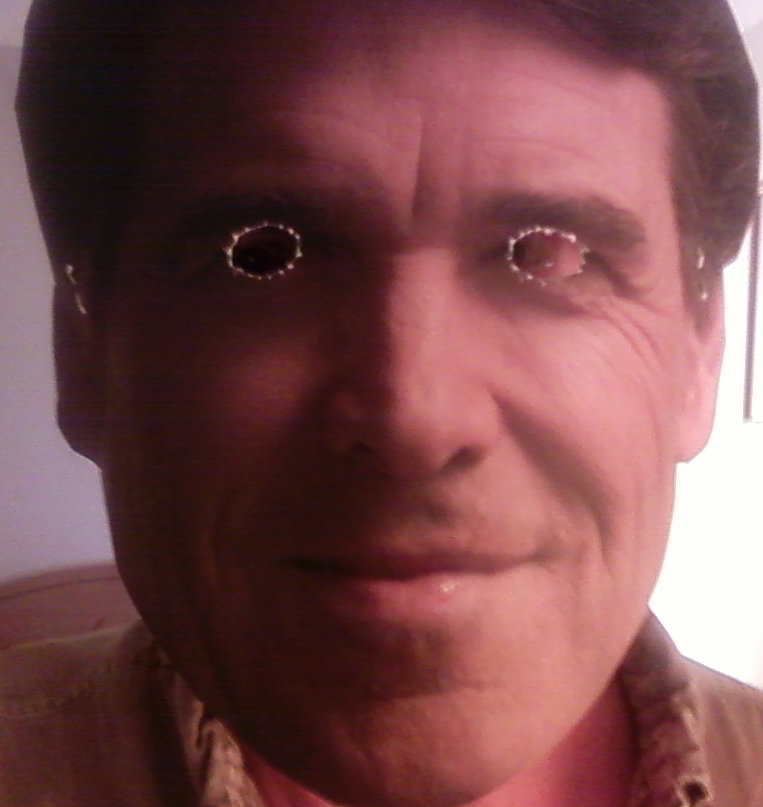 For most of modern history, Texas Governors haven't served more than two four-year terms and most had trouble doing that. Although they might be able to appoint a lot of folks to state agencies, current Governors couldn't re-make the agency into their own private fiefdom because there were too many members who owed their jobs to former Governors, maybe even ones from a different political party, or with different ideas about policy.
For most of modern history, Texas Governors haven't served more than two four-year terms and most had trouble doing that. Although they might be able to appoint a lot of folks to state agencies, current Governors couldn't re-make the agency into their own private fiefdom because there were too many members who owed their jobs to former Governors, maybe even ones from a different political party, or with different ideas about policy.
Rick Perry's never-ending-term has changed that. In office for 12 years and counting, he's managed to use time and the power of appointment to remake just about every executive branch agency the state has. And not just at the top, but deep, deep down into the upper and mid-level echelons of power. Because of the work we do, we see it most obviously with the Texas Commission on Environmental Quality, where Perry's influence reaches down to make sure the Chief Engineer is as ideologically-correct as the politically-appointed Chair. As a result, the Commission's science is harnessed in service to Rick Perry's perpetual campaign goals and is never allowed to contradict them.
But now that same MO seems to have backfired when it comes to superstar anti-cancer researchers who don't need the connections or positions Perry offered them.
Via the New York Times, (how come we haven't heard about this as much from Texas news outlets?) comes word that at least seven more scientists joined their former boss, a Nobel Prize winner, in walking out of Governor Perry's "Cancer Prevention and Research Institute." With $700 million in grant money, only the federal government offered more cash for research projects, so what could have forced such a walk-out?
Apparently, the researchers had the quaint idea that they'd actually be working on ways to, you know, cure cancer. Instead, Perry seems to have wanted the fund to provide another pipeline of money to his cronies in industry by focusing on "commercialization projects" that "focus on turning research into drugs or other products that can be sold rather than financing research itself."
Nobel laureate Dr. Alfred G Gilman resigned in protest last May after the Institute voted to approve such a $20 million dollar commercialization project. Now his colleagues are leaving in droves for the same reason.
"Phillip A. Sharp, another Nobel laureate, was among seven scientists who resigned last week, writing in his resignation letter that the agency’s decisions have carried a “suspicion of favoritism” in how the state is handing out taxpayer dollars.
Brian Dynlacht, another scientist who is leaving, warned that the agency was headed down a path of systematic abuses.
“You may find that it was not worth subverting the entire scientific enterprise — and my understanding was that the intended goal of C.P.R.I.T. was to fund the best cancer research in Texas — on account of this ostensibly new, politically driven, commercialization-based mission,” Dr. Dynlacht wrote in his letter."
Let's just be very clear about this. As long as Rick Perry is Governor, anyone who tells you a Texas state agency is an adequate watchdog for any industry, much less the state's polluters, either has no idea how state government works these days, or knows exactly how it works and is sending you down the proverbial garden path.

